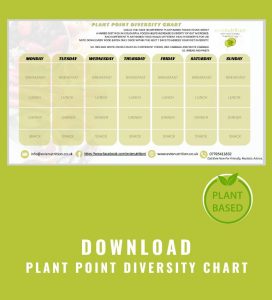Take the 30 Day Plant-Based Challenge: Boost Gut Health One Plant at a Time
The 30 Day Plant-Based Challenge is a great way to improve your gut health and overall wellbeing. When it comes to digestion and immunity, diversity matters more than you might think. In fact, research shows that people who eat more than 30 different plant-based foods each week enjoy a more diverse and resilient gut microbiome. This diversity helps with digestion, strengthens your immune system, and supports the production of short-chain fatty acids, which are key indicators of good gut health.
And no, this doesn’t mean eating salads for every meal. Whether it’s whole grains, herbs, nuts, or seeds – every plant counts. To make the process simple and motivating, I’ve created a Free Downloadable Plant Point Chart to help you stay on track and enjoy the journey.
Why 30 Different Plant-Based Foods?
This challenge is inspired by findings from the American Gut Project. They discovered that people who ate over 30 different types of plant-based foods each week had significantly more diverse gut bacteria than those who consumed fewer. A varied microbiome plays a crucial role in reducing inflammation, supporting immunity, improving digestion, and even enhancing mood and mental clarity.
Each new plant food you include feeds a different type of beneficial bacteria in your gut. That’s why variety is so important. Think of your gut as a garden – the more types of seeds you plant, the healthier and more resilient it becomes.
What Counts as a Plant-Based Food?
Much more than just vegetables. In this challenge, you can count a wide range of plant-based foods. This includes fruits and vegetables, as well as nuts, seeds, legumes, whole grains, and pulses. Fresh herbs, dried spices, fermented foods like kimchi or sauerkraut, and even herbal teas all qualify.
Different varieties of the same food count too. For instance, red onions and white onions are counted separately. So are spinach and rocket. The key is to keep things varied and colourful.
The Power of Butyrate: Your Gut’s Secret Weapon
When your gut bacteria digest fibre, they create substances known as short-chain fatty acids (SCFAs). One of the most beneficial of these is butyrate. It helps nourish the cells lining your gut, reduces inflammation, supports immune responses, and improves the way your gut and brain communicate. The more variety in your plant-based intake, the more your gut can produce butyrate, giving you stronger support from the inside out.
Take the 30 Day Plant-Based Challenge
To help you reach your goal of 30 different plant-based foods a week, I’ve designed a simple and fun Plant Point Diversity Chart. This free tool makes the 30 Day Plant-Based Challenge easy to follow and satisfying to complete. It’s a visual way to keep yourself motivated and see your progress in real time.
This isn’t about being perfect. It’s about progress. Every extra plant counts.
Sample Day: How to Reach 25+ Plant Foods Without Stress
Here’s an example of what a typical high-diversity day can look like:
Breakfast: Overnight oats made with almond milk, banana, blueberries, chia seeds, walnuts, and cinnamon
Lunch: A quinoa bowl featuring black beans, red pepper, spinach, avocado, fresh lime, and chopped coriander
Dinner: Stir-fry with tofu, mushrooms, carrots, garlic, ginger, and sesame oil, served on brown rice
Snack: Apple slices paired with a spoonful of peanut butter
This day adds up to over 25 different plant foods. It’s easier than it sounds – small swaps and additions can make a big impact. Swapping lettuce for mixed greens, rotating your grains, or trying a new herb can all help you reach your goal.
Tips to Maximise Variety
-
Use mixed greens instead of just lettuce
-
Try new herbs and spice blends
-
Rotate grains such as quinoa, oats, bulgur, or millet
-
Add a mix of seeds and nuts to salads and snacks
-
Use tinned mixed beans or lentils to add quick variety
What Happens When You Feed Your Gut Well?
As your microbiome becomes more diverse, you’ll likely notice real benefits. Many people experience more energy, improved digestion, reduced bloating, and fewer cravings. You might also see a boost in your mood, better focus, and a stronger immune system.
This is because a well-fed gut can absorb nutrients more effectively and crowd out harmful bacteria. Over time, these small changes can lead to big improvements in your overall health.
Let’s Make Gut Health Simple
This challenge isn’t about being perfect. It’s about learning how to support your body through diversity and small, consistent changes. Every new plant food you add is a step towards better gut health.
So, why not take the first one today? Download the tracker, start counting your plant points, and see how much better you feel.
Ready To Reboot Your Gut Health But Need Support?
If you’re struggling with IBS symptoms, frequent bloating, or find fibre-rich foods difficult to digest, it could be a sign that your gut needs a more personalised approach. I offer one-to-one Nutritional Therapy consultations and gut health programmes to help you get the support you need.
? Explore my services
? Book a free discovery call to chat through how I can support you.
Let’s make gut health simple, enjoyable and effective. One plant at a time.
Nutritional Therapist Gut Health Specialist
Discover how I can help you or your work team with a tailored nutrition plan or talk. From managing energy levels to improving sleep, my services are designed to guide you every step of the way.
? Learn more about my services here
_____________________________________________________
The information contained in this blog is provided for information purposes only. The contents do not constitute medical advice. Always consult a professional before taking any action based on this blog. For personalized guidance, consult Evie Whitehead, a registered and qualified Nutritional Therapist (dipION, mBANT, CNHC). Evie Whitehead disclaims all liability and responsibility arising from any reliance placed on any of the contents.





